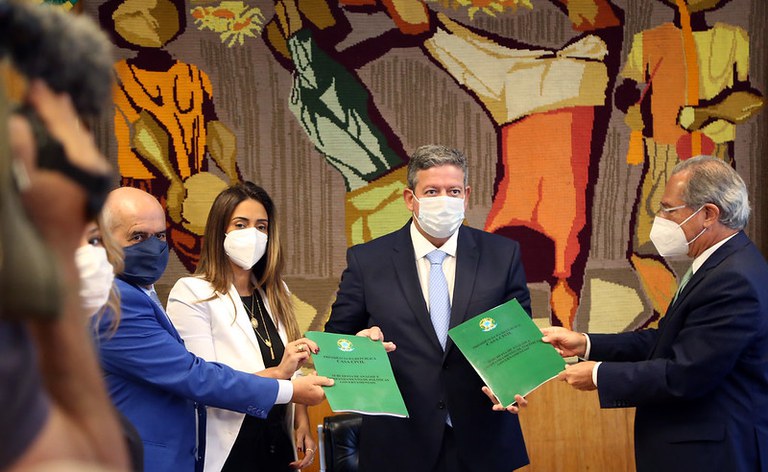ECONOMY
Government delivers the 2nd phase of the Tax Reform to the National Congress
Project was delivered to the president of the Chamber of Deputies, Arthur Lira - Photo: Ministry of Economy
Economy Minister Paulo Guedes delivered, this Friday (25), to the president of the Chamber of Deputies, Arthur Lira, the second phase of the Tax Reform. The Bill deals with the Reform of the Income Tax for Individuals, for Companies and Investments. According to the Government, the change will bring simplification and less cost, reduction of distortions and end of privileges without reducing the Union's collections.
“What we are doing, for the first time, is increasing taxes on capital income, which are dividend taxes, and with that, the taxes will be reduced to 30 million salaried Brazilians. These taxes that go up there will allow for a reduction in taxes for companies, on the one hand, and on the other, for salaried workers”, said minister Paulo Guedes.
In July last year, Minister Paulo Guedes presented the first stage of the Tax Reform proposal to the National Congress. At this stage, the proposal provides for a reformulation of taxation on consumption with the creation of the Contribution on Goods and Services (CBS) to replace the current PIS/Cofins.
Learn about the main points of proposed changes in the Income Tax:
Physical person
Under the proposal, the exemption from Income Tax for Individuals will be updated for those who receive a monthly salary of up to R$ 2.5 thousand. Today, the exemption is for those with a salary of up to R$ 1,900. According to the Ministry of Economy, this change will increase the number of Brazilians who will not pay their income tax from 10.8 million to 16 million. The measure represents a 31% increase in the exemption range.
According to the minister of Economy, Paulo Guedes, the reform will benefit around 30 million Brazilians.
The 27.5% rate, for example, which is currently applied to those with a salary starting at R$ 4,664.68, will only apply to those who earn more than R$ 5,300.01.
Another change is the simplified discount, which sets the income tax percentage at 20%, regardless of the amount received. In the project presented by the Government, this option is restricted to those who receive up to R$ 40 thousand per year. For the Ministry of Economy, the measure will encourage the taxpayer to request an invoice.
The proposal will also allow the taxpayer to update property values. Today, in the declaration, the properties are kept at their original value. When selling the good, the citizen must pay between 15% and 22.5% capital gain tax. With the change, it will be possible to update the equity values, with an incidence of only 5% tax on the difference. With this, the taxpayer will pay less taxes when selling the good.
The project also contemplates the taxation of profits and dividends received from equity interests in companies. Until now, these revenues were exempt from income tax, but under the project, they will be taxed at source at 20%. There will be an exemption for up to R$ 20 thousand per month for micro and small businesses.
Companies
For companies, the reform of the income tax will allow a reduction in the general income tax rate in two stages: from the current 15% to 12.5% in 2022, and 10% as of 2023. The additional 10% for profits above R$ 20 thousand per month remain. Payments of bonuses and profit sharing to partners and directors made with company shares cannot be deducted as operating expenses.
The proposal also prohibits the possibility of deducting interest on equity. This possibility was created when it was difficult to access credit and companies needed to finance themselves with resources from partners.
The project also brings new rules for the reorganization of companies and taxation of capital gains on the sale of equity interests. The measure will prevent the improper use of deductions in the sale of equity interests.
The proposal also creates clear rules for calculating capital gains on indirect disposals of assets in Brazil by companies abroad. Currently, there may be an intermediary company in the sale of assets to pay less tax.
Companies must also calculate quarterly Corporate Income Tax (IRPJ) and Social Contribution on Net Income (CSLL). Today, there are two options: quarterly and yearly. Companies with annual taxation need to calculate and pay estimates on a monthly basis. With the bill, it will be allowed to offset 100% of the loss of one quarter in the following three. Companies will be able to approximate the bases of IRPJ and CSLL calculations.
.

 Mr. Alessandro Jacob speaking about Brazilian Law on "International Bar Association" conference
Mr. Alessandro Jacob speaking about Brazilian Law on "International Bar Association" conference